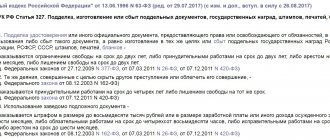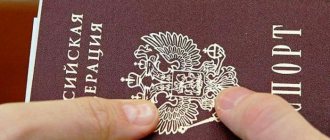Criminal Code of the Russian Federation in the latest edition:
Article 327 of the Criminal Code of the Russian Federation. Forgery, production or circulation of counterfeit documents, state awards, stamps, seals or forms
1. Forgery of an official document granting rights or exempting from obligations for the purpose of its use or sale of such a document, or production for the same purposes or sale of counterfeit state awards of the Russian Federation, RSFSR, USSR, stamps, seals or forms -
shall be punishable by restriction of freedom for a term of up to two years, or forced labor for a term of up to two years, or arrest for a term of up to six months, or imprisonment for a term of up to two years.
2. Forgery of a citizen’s passport or certificate granting rights or exempting from obligations for the purpose of their use or sale of such documents -
shall be punishable by restriction of freedom for a term of up to three years, or forced labor for a term of up to three years, or imprisonment for a term of up to three years.
3. Acquisition, storage, transportation for the purpose of use or sale, or use of a deliberately counterfeit citizen’s passport, identity card or other official document granting rights or releasing from duties, stamps, seals or forms -
shall be punishable by restriction of freedom for a term of up to one year, or forced labor for a term of up to one year, or imprisonment for a term of up to one year.
4. Acts provided for in parts one to three of this article, committed with the aim of concealing another crime or facilitating its commission, -
shall be punished by forced labor for a term of up to four years or imprisonment for the same term.
5. Use of a knowingly forged document, except for the cases provided for in part three of this article, -
shall be punishable by a fine in the amount of up to eighty thousand rubles, or in the amount of the wages or other income of the convicted person for a period of up to six months, or by compulsory labor for a term of up to four hundred eighty hours, or by corrective labor for a term of up to two years, or by arrest for a term of up to six months.
Return to the table of contents of the document: Criminal Code of the Russian Federation in the latest edition
Comments on Article 327 of the Criminal Code of the Russian Federation
The main object of the crime is the normal activities of public authorities and management. An additional object is the rights and legitimate interests of citizens and legal entities.
The social danger of the act lies in the fact that it violates the established procedure for handling official documents, stamps, forms, seals, as well as the rights of citizens.
A forged document is a document containing deliberately distorted information about certain facts. Distortion of information can be carried out by forging the signature of the applicant and other persons, the certification inscription (signature and seal) of a notary, making corrections to the text of the document through erasures, additions, reprints, etc., including using various types of technical means.
Forgery of a document can be either partial (making changes through erasures, additions, reprints, etc. to an original document) or complete (creating a completely false document) (letter of the Federal Tax Service of Russia dated April 23, 2014 N SA-4-14 /7872).
Criminal liability
So, falsifying an identity card or an official document entails liability under criminal law. Based on judicial practice, a fake can be:
- complete – when a completely false document is produced.
Thus, manufacturing occurs when the guilty person does not make changes, but completely produces a fake - starting from new paper, “crust”, form, etc. Example No. 3 . Rogov K.Yu. was a disabled person of group 2. Since he could not move, he was entitled to benefits for the use of transport, free rest in a sanatorium with treatment for spinal diseases, etc. After a successful operation, motor functions of Rogova K.Yu. fully recovered, the commission removed the disabled status. However, Rogov K.Yu. falsified a certificate of disability, completely recreating the document that he had once used. Signs of falsification were noticed by employees of the medical institution when presenting the medical document to K.Yu. Rogov, a criminal case was initiated under Part 1 of Art. 327 of the Criminal Code of the Russian Federation. - partial - when certain information needed by the culprit is entered into the document, while the structure of the document itself does not change and, with the exception of the changes made, the document is genuine. In practice, this may include changes to details, dates, amounts, etc. Forgery of a signature on a document also entails the recognition of the entire document as false.
- when erasures, corrections, and pastings are made , the necessary information changes to that in which the culprit is interested. In practice, there are cases when the entire document corresponds to reality, but another photograph is pasted in. This is also considered fake.
Regardless of whether the forgery is complete or partial, the document is considered to be counterfeit as a whole, resulting in liability under Art. 327 of the Criminal Code of the Russian Federation. This article has three parts, each of which is applied based on the circumstances of the crime.
In addition to this, in theory, a distinction is made between the falsification of the medium itself - paper, electronic, and the introduction of false information only into the text of a genuine document.
Thus, there can be many ways of forgery, depending on the type and purpose of the document. Citizens at the age of 16 become liable for such actions under one of the three parts of Article 327 of the Criminal Code of the Russian Federation. Let's look at each of these parts in more detail.
Criminal and administrative liability for forgery of documents
Forgery of an identity document confirming that a person has a right or exemption from an obligation, as well as forgery of a stamp, seal, form, their use, transfer or sale, entails administrative liability under Part 1 of Art. 19.23 Code of Administrative Offenses of the Russian Federation.
The objective side of the crime under Art. 327 of the Criminal Code of the Russian Federation, expressed as in Art. 19.23 of the Code of Administrative Offenses of the Russian Federation, a deliberate act related to the forgery of a document, its production, or sale.
In Art. 19.23 of the Code of Administrative Offenses of the Russian Federation there is no indication of the purpose of forgery as a mandatory sign of the objective side of the offense.
Unlike Art. 19.23 of the Code of Administrative Offenses of the Russian Federation, a mandatory element of the crime provided for in Art. 327 of the Criminal Code of the Russian Federation, is its purpose - the use or sale of a document (Parts 1 - 3 of Article 327 of the Criminal Code of the Russian Federation), concealment of another crime or facilitating its commission (Part 4 of Article 327 of the Criminal Code of the Russian Federation).
The subject of an administrative offense can only be a legal entity, and a criminal offense - only an individual.
What documents are considered official?
The legislation does not contain a clear definition of an official document, while this concept is especially important for qualification under Art. 327 of the Criminal Code of the Russian Federation. The Supreme Court of the Russian Federation has repeatedly stated that in each specific situation the same document may or may not be official. In other words, the concept of an official document must be approached individually, taking into account two general criteria that have long been used in criminal law:
- The document participates in the official document flow, which is controlled by government authorities represented by various bodies: the State Traffic Inspectorate (issuing driver's licenses), the Ministry of Health (issuing certificates of incapacity for work), the Ministry of Education (issuing diplomas). Thus, the essence of officiality excludes the legal possibility of an ordinary citizen or an ordinary organization producing one or another form on which text is subsequently supposed to be applied. Moreover, each official document is subject to a certain registration, the procedure for which is always established by departmental regulations.
- Upon presentation of such a document, the right to receive some benefit or exemption from some obligation always arises.
Example No. 1 . When hired, the candidate for the position presented a high school diploma, which turned out to be false. The certificate has signs of officiality (issued by strictly defined authorities) and provides the right (to enter a university). A criminal case was initiated under Art. 327 of the Criminal Code of the Russian Federation.
There are many types of official documents, the forgery of which entails criminal liability:
- identification documents - that is, documents that can only be issued by competent authorities in a strictly established manner;
- notarized animals. In accordance with the legislation on notaries, a notary is a competent person, whose status is confirmed by successfully passing a qualification exam and the conclusion of the notary chamber. Consequently, when drawing up documents, the notary acts on behalf of the state - that is, even the forgery of a copy of documents certified on behalf of the notary may well become the basis for prosecution;
- issued by authorities, as well as by judicial authorities (for example, a fake certificate, writ of execution);
- electronic documents - if the rules of registration are observed (certification with an electronic signature), they also become official and can be the subject of a crime.
Within the meaning of Art. 327 of the Criminal Code of the Russian Federation, only acts of forgery, but not forgery, are subject to criminal prosecution. Thus, if a citizen intentionally presents an original document belonging to another person, there will be no criminal liability under this article.
Example No. 2 . Ivanov R.P., using the identity of his friend, Navy serviceman R.V. Vasiliev, with whom he was very similar, boarded a military ship, on which he safely reached a foreign state. Here there is no forgery of documents under the Criminal Code of the Russian Federation, since the document presented to the command is not fake.
In such situations, the actions of the official will correspond to such a crime as official forgery - under Art. 292 of the Criminal Code of the Russian Federation.
In practice
Here it must be said that nowadays there are more and more cases of people openly using false documents. It is for this reason that many citizens have a criminal record under Art. 327 of the Criminal Code of the Russian Federation (part 3). Practice shows that most young people who do not want to study acquire diplomas from various companies that legally produce printed materials. It is not so easy to detect false documents; this requires a special examination.
Citizens who used false diplomas and other certificates when applying for employment in the organization were subsequently dismissed from the enterprise on the initiative of the manager himself. After which the former employees were held accountable for the act committed.
In addition, in practice, sometimes different situations occurred. Some people even worked as doctors in the surgical department of a hospital with fake diplomas and operated on people. Other attackers taught children and even worked in government agencies.
Basics
The use of false documents is punishable by law. After all, in the Russian Federation this is considered a criminal offense. In turn, a person who presents false documents to various institutions, organizations and officials is an attacker and must be punished for what he has done. The sanctions for this crime are specified in Art. 327 of the Criminal Code of the Russian Federation, part 3.
Unfortunately, many people are not stopped even by the fact that the use of fake documents is criminally punishable. In addition, some people believe that a purchased higher education diploma is no different from the one awarded to university graduates after graduation. Although in fact this opinion is erroneous, and the use of forged papers is illegal.
What awaits the culprit?
Despite the fact that sanctions in the form of isolation from society are not included in Part 3 of Article 327 of the Criminal Code of the Russian Federation, the punishment awaiting the attacker will be no less severe here. Therefore, if a judicial authority finds a citizen guilty of using false documents, and at the same time the latter knew that the papers were forged, then the criminal expects:
- a fine of up to 80 thousand rubles or wages (other income) of the convicted person for a period of up to six months;
— or compulsory work (up to 480 hours);
— correctional labor is also provided for a period of no more than 2 years;
- and the last thing is arrest for a period of no more than 6 months.
Here it is necessary to immediately note that the punishment prescribed in part 3 of Art. 327 of the Criminal Code of the Russian Federation is an alternative. In other words, the judicial authority independently determines which of the sanctions prescribed by law to apply to the perpetrator for the crime.
Nuance
So, this means that a person can be held accountable for his actions only if the latter used forged documents to exercise his rights, the falsity of which he knew in advance. But what will happen if the citizen did not even suspect that the papers were fake? Of course, in order to prove a person’s guilt in deliberately using forged documents, a preliminary investigation must be conducted. After all, it may also be that the latter did not know that the papers were not real (for example, a citizen received a passport in the prescribed manner, but the document number in the database was not recorded). Although in practice this rarely happens.
Therefore, if the investigative authorities fail to prove the fact that a person deliberately used a false document, the latter will not suffer any punishment for this.
Compound
Forgery and the use of false documents are still intertwined. Because one crime follows from another. After all, without producing fake documents, their use will be impossible.
The composition of the act under Part 3 of Article 327 of the Criminal Code of the Russian Federation will be as follows:
- the subject is only a sane person who is already sixteen years old;
- the subjective side is presented in the form of direct intent, because a person commits a crime consciously, knowing that he is committing illegal actions;
— the object here is a violation of established state and legal norms;
— the objective side is expressed in the varied use of false documents.







